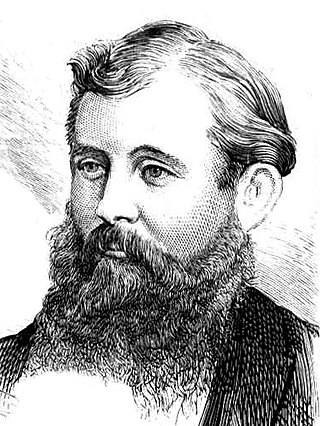Singleton was an electoral district of the Legislative Assembly in the Australian colony of New South Wales created in 1894, existing from 1894 until 1913. It was named after the town of Singleton and replaced Patrick's Plains.
Rylstone was an electoral district of the Legislative Assembly in the Australian state of New South Wales, named after and including the town of Rylstone. The district was created when multi-member constituencies were abolished in 1894, and comprised the eastern part of Mudgee and the western part of The Upper Hunter. The district was abolished in 1904 as a result of the 1903 New South Wales referendum, which reduced the number of members of the Legislative Assembly from 125 to 90, and was divided between Hartley, Singleton and the Upper Hunter.
Sydney-Pyrmont was an electoral district of the Legislative Assembly in the Australian state of New South Wales, created in 1894, partly replacing the multi-member electorate of West Sydney. It was named after and included the Sydney suburb of Pyrmont, consisting of the entire peninsula north of Fig Street and east of Wattle Street. In 1904, it was largely replaced by Pyrmont, which also absorbed part of the abolished district of Sydney-Denison.
John Charles Lucas Fitzpatrick was an Australian politician and journalist.
Upper Hunter, an electoral district of the Legislative Assembly in the Australian state of New South Wales, has had three incarnations, the first from 1859 to 1894, the second from 1904 to 1920, and the third from 1927 to the present.

John Fitzgerald Burns was an Australian politician, member of the Parliament of New South Wales, Postmaster-General in the 1870s and Colonial Treasurer in the 1880s.
The 1904 New South Wales state election involved 90 electoral districts returning one member each. The election was conducted on the basis of a simple majority or first-past-the-post voting system. There were two significant changes from the 1901 election, the first was that women were given the right to vote, which saw an increase in the number of enrolled voters from 345,500 in 1901, to 689,490 in 1904. The second was that as a result of the 1903 New South Wales referendum, the number of members of the Legislative Assembly was reduced from 125 to 90. The combined effect of the changes meant that the average number of enrolled voters per electorate went from 2,764, to 7,661, an increase of 277%. Leichhardt was the only district that was not substantially changed, while The Macquarie and The Murray districts retained nothing but the name.
Sturt, an electoral district of the Legislative Assembly in the Australian state of New South Wales, had two incarnations, from 1889 until 1968 and from 1971 until 1981.
Northumberland, an electoral district of the Legislative Assembly in the Australian state of New South Wales was created in 1859 and abolished in 1913.
Bourke, an electoral district of the Legislative Assembly in the Australian state of New South Wales was created in 1880 and abolished in 1904.
Cobar, an electoral district of the Legislative Assembly in the Australian state of New South Wales had two incarnations, from 1894 until 1920 and from 1930 until 1968.
The Hastings, an electoral district of the Legislative Assembly in the Australian state of New South Wales was created in 1859 and abolished in 1880.
Hartley, an electoral district of the Legislative Assembly in the Australian state of New South Wales had two incarnations, from 1859 until 1920 and from 1927 until 1968.
New England, an electoral district of the Legislative Assembly in the Australian state of New South Wales, was created in 1859 and abolished in 1894.
Rylstone, an electoral district of the Legislative Assembly in the Australian state of New South Wales was created in 1894 and abolished in 1904.
Singleton, an electoral district of the Legislative Assembly in the Australian state of New South Wales, was created in 1894 and abolished in 1920.
A by-election for the seat of Sydney-Phillip in the New South Wales Legislative Assembly was held on 14 October 1895 because of the resignation of Dick Meagher (Protectionist).
A by-election for the seat of Bowral in the New South Wales Legislative Assembly was held on 14 June 1895 because William McCourt was forced to resign because he was bankrupt, but was re-elected unopposed.
A by-election was held for the New South Wales Legislative Assembly electorate of South Sydney on 13 February 1893 because of the resignation of James Toohey (Protectionist), in protest at the failure of the Protectionist Dibbs government to implement principles of protection.
A by-election was held for the New South Wales Legislative Assembly electorate of Yass Plains on 2 January 1878 because Michael Fitzpatrick was appointed Colonial Secretary in the Farnell ministry. Such ministerial by-elections were usually uncontested and on this occasion the six other ministers were re-elected unopposed.

